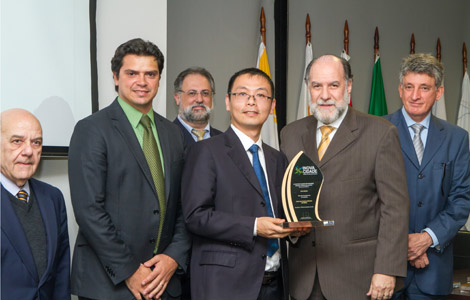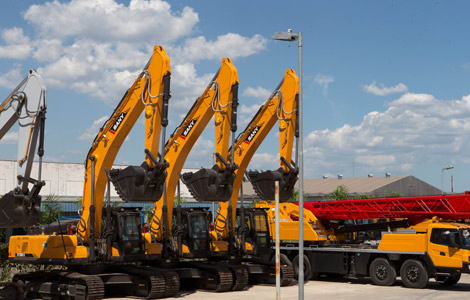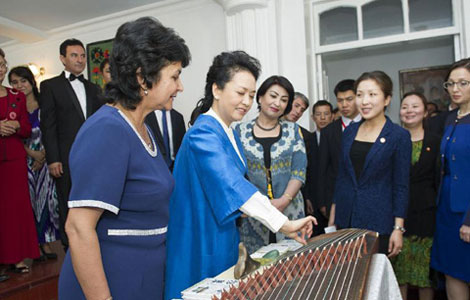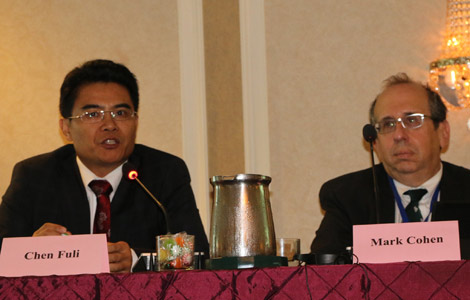China cooperation model may well suit Argentina and Brazil
Updated: 2014-09-15 03:24
By ZHANG FAN in Sao Paulo(China Daily Latin America)
|
||||||||
 |
|
Roberto Luis Troster, former chief economist of Brazilian Banks Federation, thinks that China, Argentina and Brazil can have constructive cooperation in areas such as finance, technics, industry and services in a meeting held by the Chamber of Commerce Argentine-Brazilian Sao Paulo on Sept 11 in Sao Paulo. Zhang Fan / China Daily |
With China getting more involved in Latin America, economists and observers from Argentina and Brazil are calling on the three nations to develop a new model of constructive cooperation.
Juan Pablo Lohle, the former Argentine ambassador to Brazil, said at a meeting held by the Chamber of Commerce Argentine-Brazilian in Sao Paulo on Sept 11 that the three countries should be partners rather than competitors.
"I think the partnership of the three countries will lead in a multi-polar world. I thought Argentina and Brazil should jointly cooperate with the United States eight years ago. Now I think we should do that with China," he said.
The meeting was one in a series of discussions in Brazil and Argentina aimed at developing a workable model for additional cooperation with China.
"Though it is the first time for our chamber to hold such a meeting, more people are thinking about it since China, with its growing investment, is becoming an issue for the region," said Pamela Chagas Mastrocessario, chamber manager.
Roberto Luis Troster, the former chief economist for the Brazilian Bank Federation, thinks the three countries can have a constructive relationship in areas such as finance, technology, industry and services.
"Brazil and Argentina's economies have greatly benefited from China's imports. If the three countries all want to develop, why not cooperate?" he said.
Chinese President Xi Jinping's visit to Argentina in July included a $7.5 billion loan for Argentinean infrastructure construction and energy projects, a move viewed as a signal of trust for the Latin American nation that is struggling with a debt default crisis.
Brazil, on the other hand, ranked as the ninth largest trade partner of China in 2013 with a total trade volume of about $90 billion. However, with more Chinese companies entering the country under the encouragement of both governments, economic tensions have appeared on issues such as investment and predatory pricing.
Though some industries in Argentina and Brazil are blaming competition from China, Curt Muller of the External Market of Brazilian Association of Machines and Equipment urged local industry to have a more open mind. Muller said that Brazilian businesses should not hold a defensive attitude towards China because it won't solve the problem.
"You cannot blame competition from Japanese cars for Detroit's bankruptcy in 2013 because it was the United States that did not react quickly enough to the automotive market and lost their competitiveness," said Troster. "Brazil also needs to first solve its own problems to better react to competition from China."
However, according to former ambassador Lohle, China and Latin American countries still need time to understand and accept each other due to cultural differences. His idea was supported by a recent survey from In Press, one of the largest communication agencies in Brazil.
According to the survey by In Press, although 65 percent of Chinese companies are conveying the idea of development when entering Brazil, almost all the negative reports from local media doubt the continuity of China's role in the region. At the same time, China's investment in energy and infrastructure construction received the most positive comments and 63 percent are praising the quality of Chinese products.
"In all we can find that local media welcomes China's investment, but it is hard for them to get enough information from Chinese companies and the government, so they have to rely on the information from a third source which can mislead public opinion," said Marilia Stabile, executive director of In Press.
fanzhang@chinadailyusa.com

 BYD's electric transit bus wins coveted award in Brazil
BYD's electric transit bus wins coveted award in Brazil
 Sany cracks Brazilian construction machinery market
Sany cracks Brazilian construction machinery market
 Shanghai Tourism Festival opens with razzle-dazzle
Shanghai Tourism Festival opens with razzle-dazzle
 Downpour wreaks havoc in SW China
Downpour wreaks havoc in SW China
 Drills and exercises mark World First Aid Day
Drills and exercises mark World First Aid Day
 China's first lady Peng Liyuan hits the right note
China's first lady Peng Liyuan hits the right note
 Bald is beautiful
Bald is beautiful
 China promotes IPR in US
China promotes IPR in US
Most Viewed
Editor's Picks

|

|

|

|

|

|
Today's Top News
Chinese president arrives in Maldives for state visit
Trade and investment talks
US tourist in DPRK gets 6 years of hard labor
China, Central Asia unveil new energy cooperation
Alibaba roadshow bodes well for record-breaking IPO
Chinese plant joins US firm in fuel ingredient production
CITIC braces for legal battle in HK
Xi calls for three-way economic corridor
US Weekly

|

|







